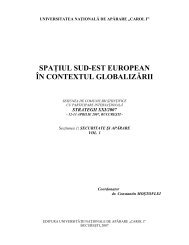PROVOCĂRI LA ADRESA SECURITĂŢII ŞI STRATEGIEI LA ÎNCEPUTUL SECOLULUI XXI
provocări la adresa securităţii şi strategiei la începutul secolului xxi
provocări la adresa securităţii şi strategiei la începutul secolului xxi
You also want an ePaper? Increase the reach of your titles
YUMPU automatically turns print PDFs into web optimized ePapers that Google loves.
Romania promotes good relations our neighbors to strengthen and<br />
project stability across NATO’s borders.<br />
One main goal of Romania is contribute to the strengthening of<br />
NATO’s cooperation with partners in the East, such as the Republic of<br />
Moldova, the Ukraine, Russia, and, across the Black Sea, with the nations in<br />
the Caucasus and Central Asia.<br />
The Romanian’s PfP experience could be valuable for the nations<br />
which are situated in The Black Sea Area.<br />
Romania will continue to participate to missions of NATO or to<br />
missions where most of NATO’s members are participating in.<br />
Another important direction is the Romanian participation in the<br />
transformation and adaptation of NATO’s military capabilities, including<br />
the NATO Response Force (the NRF).<br />
Also, it will be adapted Romanian own armed forces to the new<br />
challenges and security environment [17]. The new force structure will be<br />
more flexible and effective, able to provide more deployable and sustainable<br />
forces, as well as to contribute to the full range of NATO missions. By<br />
2007, the Romanian Armed Forces will be an all-volunteer army with a<br />
military strength of 75,000 or below, including land forces, air forces and<br />
maritime forces [18].<br />
Romania is prepared to contribute to Allied land, air and maritime<br />
forces. Some of these capabilities have already been used in multinational<br />
operations, together with troops belonging to NATO nations.<br />
Figura 8 Russia<br />
RUSSIA<br />
Security problems:<br />
- China continues to seek a mutually acceptable solution to the<br />
disputed alluvial islands at the confluence of the Amur and Ussuri<br />
Rivers and a small island on the Argun River as part of the 2001<br />
Treaty of Good Neighborliness, Friendship, and Cooperation;<br />
- the sovereignty dispute over the islands of Etorofu, Kunashiri,<br />
Shikotan, and the Habomai group known in Japan as the "Northern<br />
Territories" and in Russia as the "Southern Kurils," occupied by the<br />
Soviet Union in 1945, now administered by Russia, and claimed by<br />
Japan, remains the primary sticking point to signing a peace treaty<br />
formally ending World War II hostilities;<br />
- about a third of the boundary with Georgia remains not delimited<br />
and none of it demarcated with several small, strategic segments<br />
remaining in dispute;<br />
- OSCE observers monitor volatile areas such as the Pankisi Gorge<br />
in the Akhmeti region and the Argun Gorge in Abkhazia;<br />
- equidistant seabed treaties have been signed with Azerbaijan and<br />
Kazakhstan in the Caspian Sea but no consensus on dividing the<br />
water column among the littoral states;<br />
- Russia and Norway dispute their maritime limits in the Barents Sea<br />
and Russia's fishing rights beyond Svalbard's territorial limits<br />
within the Svalbard Treaty zone;<br />
- Russia continues to reject signing and ratifying the joint 1996<br />
technical border agreement with Estonia;<br />
- the Russian Parliament refuses to consider ratification of the<br />
boundary treaties with Estonia and Latvia, but in May 2003,<br />
ratified land and maritime boundary treaty with Lithuania, which<br />
ratified the 1997 treaty in 1999, legalizing limits of former Soviet<br />
republic borders;<br />
- a simplified transit regime was adopted in July 2003 for residents<br />
of the Kaliningrad coastal exclave to travel through Lithuania to<br />
Russia;<br />
- delimitation of land boundary with Ukraine is complete, but<br />
boundary through the Sea of Azov and Kerch Strait remains<br />
unresolved despite a December 2003 framework agreement and ongoing<br />
expert-level discussions;<br />
- Ukraine protests Russia's construction of a causeway in the<br />
direction of Ukrainian-administered Tuzla Island in the Kerch<br />
Strait;<br />
- Kazakhstan and Russia will complete delimitation of their interstate<br />
border in 2004 and demarcation is underway;<br />
289<br />
290




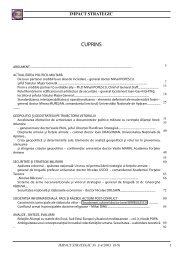
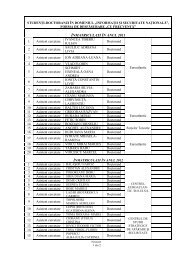
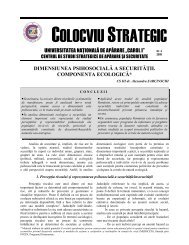
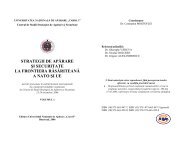
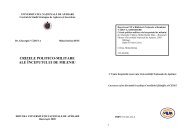
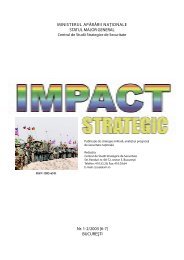


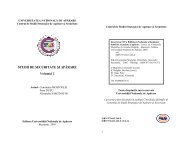
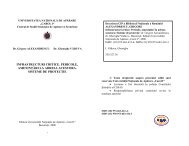
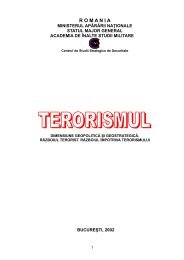
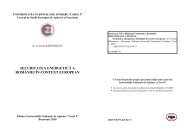
![„CAROL Nr 4 [29]/2008](https://img.yumpu.com/53801719/1/184x260/carol-nr-4-29-2008.jpg?quality=85)
